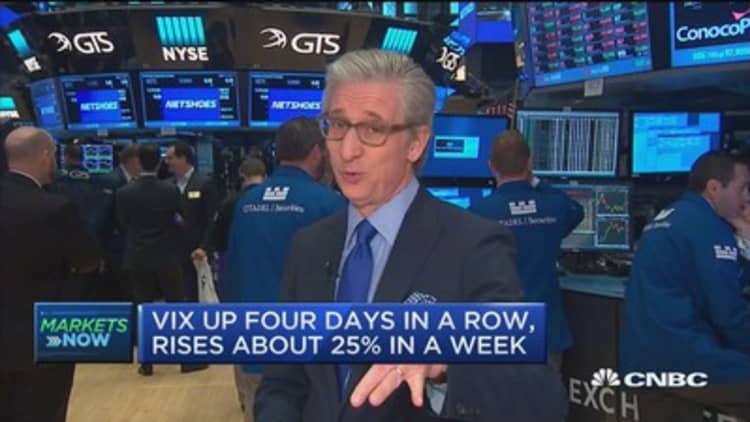
U.S. equities closed lower on Wednesday as investors assessed the geopolitical landscape. The dollar hit a session low after President Donald Trump told the Wall Street Journal he thought the currency was getting "too strong."
The dollar index, which tracks the greenback's performance against six major currencies, last traded 0.5 percent lower at 100.23 after hitting its lowest level of the month.
As the safe-haven trade continued Wednesday, the fell to session lows around 1.21 percent, while the 10-year yield fell below the psychologically key 2.30 percent level.
"Nothing seems to be happening or not happening as fast as people would like it to happen," said Peter Coleman, head trader at Convergex.
Other traditional safe-haven assets rose, building on gains from Tuesday' session. Gold futures for June delivery rose $3.90 to settle at $1,275.50 per ounce, while the dollar hit its lowest level since November against the Japanese yen. The CBOE Volatility Index (VIX), widely considered the best gauge of fear in the market, traded near 15.66.
"There's a lot of uncertainty that's really hard to model. That's why you're seeing this give-and-take [in stocks] and the uptick in volatility," said Sam Stovall, chief investment strategist at CFRA Research.
Dollar index intraday
Source: FactSet
Secretary of State Rex Tillerson visited Moscow on Wednesday and received a barrage of criticism from several Russian officials.
Tillerson said in a news conference Wednesday that U.S.-Russia relations are at a "low point" and need to improve. "The world's two foremost nuclear powers cannot have this kind of relationship," Tillerson said.
All that said, stocks have held their ground this week. The three major indexes are just marginally lower for the week.
"We are concerned about Syria and Russia, ... but at the same time we have a very resilient market," said Art Hogan, chief market strategist at Wunderlich Securities. "That could change if one of these geopolitical hotspots heats up, and there's no way to fully price that in."
Geopolitical tensions have been brewing ahead of a highly anticipated earnings seasons. Earnings are expected to have grown around 10 percent in the first quarter, according to Thomson Reuters. Sales, meanwhile, are expected to have grown the most since 2011.
"We're about to start earnings season and [bank analyst] Dick Bove is telling everyone that the banks are a terrible investment, and they're up first," said Maris Ogg, president at Tower Bridge Advisors.
JPMorgan, Wells Fargo and Citigroup are scheduled to report Thursday morning. Delta Air Lines, meanwhile, posted better-than-expected results, sending its stock higher in the premarket.
Investors were also trying to get a sense of the Trump administration's priorities. Trump said in an interview with Fox Business on Wednesday he wants to tackle health care reform before implementing new tax policy.
"I have to do healthcare first, I want to do it first to really do it right," Trump said.
Stocks rallied after Trump was elected in part because of the prospects of lower taxes, deregulation and fiscal policy.
"The market has known this for a while. He didn't say anything new," said Peter Boockvar, chief market analyst at The Lindsey Group. "The question is how far along health care is, because depending on what they get done there, they'll know what kind of tax reform they can get."
Financials were among the worst decliners as U.S. Treasury yields fell. The SPDR S&P Regional Banking ETF (KRE) was closing about 1.4 percent lower.
The financials led the post-election market rally on promises of pro-growth policies but were trading lower for the year so far on Wednesday.
Boeing and Caterpillar had the greatest negative impact on the Dow, closed below its 50-day moving average for the first time since Nov. 7.
The S&P 500 also fell below its 50-day moving average with materials and industrials the worst performers. The index also closed below its 50-day moving average for the first time since Nov. 8.
The Nasdaq composite dropped 0.5 percent.
Crude oil prices struggled for gains and settled 0.54 percent lower at $53.11 a barrel after the U.S. Energy Information Administration reported a slightly larger-than-expected drawdown of 2.17 million barrels.
Major U.S. Indexes
The Dow Jones industrial average closed 59.44 points lower, or 0.29 percent, at 20,591.86, with Caterpillar leading decliner and Nike the top advancer.
The declined 8.85 points, or 0.38 percent, to close at 2,344.93, with industrials leading seven sectors lower and utilities outperforming.
The Nasdaq pulled back 30.61 points, or 0.52 percent, to end at 5,836.16.
About two stocks declined for every advancer at the New York Stock Exchange, with an exchange volume of 766.06 million and a composite volume of 3.164.98 billion at the close.
—CNBC's Evelyn Cheng and Silvia Amaro contributed to this report.
Correction: Gold futures for June delivery rose $3.90 to settle at $1,275.50 per ounce. A previous version of this story misstated the measurement unit.
On tap this week:
Thursday
Earnings: Citigroup, JPMorgan Chase, Wells Fargo, PNC Financial, Taiwan Semiconductor, First Republic Bank, Commerce Bancshares, Apogee, Infosys
8:30 a.m. Jobless claims
8:30 a.m. PPI
Friday
U.S. markets closed
8:30 a.m. Retail sales
8:30 a.m. CPI
10:00 a.m. Consumer sentiment
10:00 a.m. Business inventories


